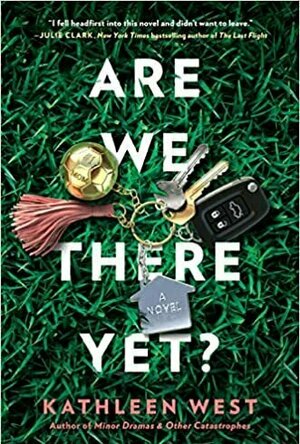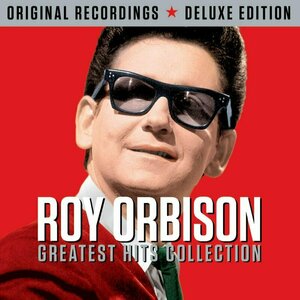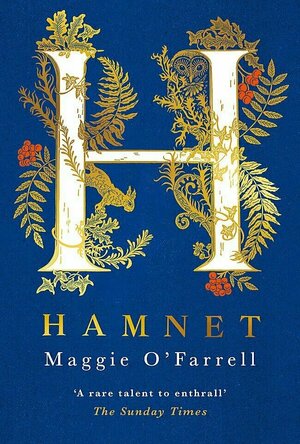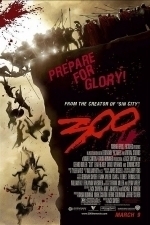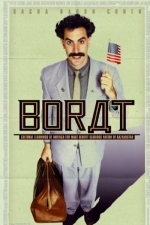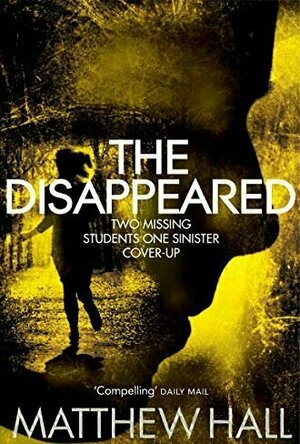Search
Search results
Rachel Unthank recommended Frost and Fire by The Watersons in Music (curated)
Kristy H (1252 KP) rated Are We There Yet? in Books
Jul 1, 2021
A heartfelt look at parenting and growing up
Alice Sullivan is an interior designer and mom whose nearly perfect life goes off the rails when her son Teddy gets in trouble bullying at school. The same day she learns her daughter Adrian is having trouble keeping up in second grade. Soon Alice learns Teddy is caught up in a social media battle with another kid and she's rapidly being subjected to the judgement of the other moms. This includes her good friend, Meredith, whose daughter Sadie may be more involved than Meredith realizes. Then, Alice finds herself reeling further when her mom, Evelyn, reveals a long-held secret. Alice needs to stop caring what other people think--and starting focusing on her family. Fast.
This book was one of those happy surprises, where it was even better than I expected. It was real and captivating, highlighting how difficult it is to be both a parent and kid in the digital age. The story is expertly told from a variety of perspectives--Alice, Meredith, Teddy, Evelyn, and Sadie.
West does such a great job of portraying the interconnected people, both kids and parents, in her tale. All are mostly trying their best but often failing while some are judging others. Yet it seems like their world falls apart anyway. Everyone's story was told in such a unique voice, and I could not help but feel so sorry for these kids trying to survive in a digital age, and their parents attempting to maintain some type of control.
Overall, this is excellent book--very timely, realistic, and both heartbreaking and hopeful. 4.25 stars.
This book was one of those happy surprises, where it was even better than I expected. It was real and captivating, highlighting how difficult it is to be both a parent and kid in the digital age. The story is expertly told from a variety of perspectives--Alice, Meredith, Teddy, Evelyn, and Sadie.
West does such a great job of portraying the interconnected people, both kids and parents, in her tale. All are mostly trying their best but often failing while some are judging others. Yet it seems like their world falls apart anyway. Everyone's story was told in such a unique voice, and I could not help but feel so sorry for these kids trying to survive in a digital age, and their parents attempting to maintain some type of control.
Overall, this is excellent book--very timely, realistic, and both heartbreaking and hopeful. 4.25 stars.
Jeff Lynne recommended Greatest Hits by Roy Orbison in Music (curated)
I think this has probably made it to the top of my favourite books of the year. How can this possibly be topped by anything else?
Hamnet is an imagining of what could have happened to Shakespeare’s son - even in the parish records it doesn’t say what his cause of death was. Maggie O’Farrell makes this version completely plausible though: plague should have been a real threat at this time. It killed indiscriminately: young and old, rich and poor, weak and strong. They were all vulnerable to illnesses with no cures. I’m something of an emotional reader at the best of times, but as Agnes, Hamnet’s mother, was preparing her son for burial, I was crying in to my breakfast. My 16 year old son looked at me over the top of his bacon butty and said:”Another sad bookthen, Mum?”, and shook his head. To read of a mother and her dead son, and see my 13 and 16 year old sons merrily tucking in to their bacon sandwiches, may not have been the ideal time to be reading this.
This is the kind of book that makes you really look at how precarious life was in those times, and how lucky we are today to have so few worries on this scale (Covid-19 aside!).
The writing is so beautiful, so descriptive and emotive: it picks you up and sets you down squarely in Elizabethan Stratford, making you feel exactly how Agnes must have felt. Honestly, it broke my heart to read of her pain.
If you haven’t read this yet, you’re in for a treat. This deserves ALL the awards.
Hamnet is an imagining of what could have happened to Shakespeare’s son - even in the parish records it doesn’t say what his cause of death was. Maggie O’Farrell makes this version completely plausible though: plague should have been a real threat at this time. It killed indiscriminately: young and old, rich and poor, weak and strong. They were all vulnerable to illnesses with no cures. I’m something of an emotional reader at the best of times, but as Agnes, Hamnet’s mother, was preparing her son for burial, I was crying in to my breakfast. My 16 year old son looked at me over the top of his bacon butty and said:”Another sad bookthen, Mum?”, and shook his head. To read of a mother and her dead son, and see my 13 and 16 year old sons merrily tucking in to their bacon sandwiches, may not have been the ideal time to be reading this.
This is the kind of book that makes you really look at how precarious life was in those times, and how lucky we are today to have so few worries on this scale (Covid-19 aside!).
The writing is so beautiful, so descriptive and emotive: it picks you up and sets you down squarely in Elizabethan Stratford, making you feel exactly how Agnes must have felt. Honestly, it broke my heart to read of her pain.
If you haven’t read this yet, you’re in for a treat. This deserves ALL the awards.
LeftSideCut (3776 KP) rated 300 (2007) in Movies
Oct 3, 2020
There's a few Zack Snyder films that I genuinely like, and 300 is one of them. It's 100% style over substance, it's overly gratuitous in the sheer amount of slow motion, but it's pretty enjoyable.
Some of the shots are expertly crafted recreations of the graphic novel by Frank Miller and Lynn Varley, and as such, is a damn faithful adaption of a cult classic comic series.
The visual effects are stunning at times, and the sepia tone it's draped in lends a lot to its overall feel (even if it's a subject of criticism from many)
Gerard Butler takes the lead as King Leonidas of Sparta, in what has arguably become his most well known roll in the years following. It's easy to look over his thick Scottish accent (in ancient Greece...) when he's playing the character with such enthusiasm. Most of his lines have become highly quotable, even familiar to those who have never seen the film. 300 would be a much lesser film without his involvement.
Rodrigo Santoro carves a striking figure as primary antagonist Xerxes, his androgynous look and demonic-like voice providing a memorable villain.
The cast is rounded out by the likes of Lena Headey, David Wenham, Dominic West, and an early role for Michael Fassbender, a sturdy ensemble cast.
The set pieces are pretty thrilling, and results in a movie that blurs the fantastical, with a real life historic battle. It's an interesting mix that works well.
300 is a film that throws big sloppy buckets of testosterone at its audience, whilst simultaneously flaunting a silly amount of homoerotic undertones and CGI pectoral muscles, and it's great.
Some of the shots are expertly crafted recreations of the graphic novel by Frank Miller and Lynn Varley, and as such, is a damn faithful adaption of a cult classic comic series.
The visual effects are stunning at times, and the sepia tone it's draped in lends a lot to its overall feel (even if it's a subject of criticism from many)
Gerard Butler takes the lead as King Leonidas of Sparta, in what has arguably become his most well known roll in the years following. It's easy to look over his thick Scottish accent (in ancient Greece...) when he's playing the character with such enthusiasm. Most of his lines have become highly quotable, even familiar to those who have never seen the film. 300 would be a much lesser film without his involvement.
Rodrigo Santoro carves a striking figure as primary antagonist Xerxes, his androgynous look and demonic-like voice providing a memorable villain.
The cast is rounded out by the likes of Lena Headey, David Wenham, Dominic West, and an early role for Michael Fassbender, a sturdy ensemble cast.
The set pieces are pretty thrilling, and results in a movie that blurs the fantastical, with a real life historic battle. It's an interesting mix that works well.
300 is a film that throws big sloppy buckets of testosterone at its audience, whilst simultaneously flaunting a silly amount of homoerotic undertones and CGI pectoral muscles, and it's great.
LeftSideCut (3776 KP) rated Borat (2006) in Movies
Oct 22, 2020
It can not be understated how important Sacha Baron Cohen is in the modern comedy landscape. His particular brand of satire has always stirred up controversy, but has always been appealing to me. He arguably hit his peak during Ali G in the USAiii, where he posed as multiple characters, namely Ali G, Brüno, and Borat. It was only a matter of time before the latter got his own feature film.
Borat is offensive in so many ways, but I'll be damned if it isn't clever. The character is anti-semitic, sexist, and homophobic. Of course, Cohen himself isn't any of these things, but this role he plays truly brings out the worst in real life people that he interviews for his "documentary". As soon as he says something unorthodox, his subject will let their guard down, feel comfortable, and join in. It's quite something, and results in Cohen exposing the ugliness of somenof these people.
The over-arching narrative is thread bare (and honestly not intended to be the main focus) but climaxes in such a hilariously surreal fashion.
I'm not conviced that some of the stuff in this movie would fly now (at the time of writing, the second Borat movie is due to release tomorrow so we will see!), but Cohen's recent series, Who Is America?, showed clear as day that he is still as sharp, brutal, and out for blood as he ever has been.
Borat is another fine semi-exposé, that is frequently hilarious, and constantly disturbing, that is still as relevant and needed now as it was back in 2006.
Borat is offensive in so many ways, but I'll be damned if it isn't clever. The character is anti-semitic, sexist, and homophobic. Of course, Cohen himself isn't any of these things, but this role he plays truly brings out the worst in real life people that he interviews for his "documentary". As soon as he says something unorthodox, his subject will let their guard down, feel comfortable, and join in. It's quite something, and results in Cohen exposing the ugliness of somenof these people.
The over-arching narrative is thread bare (and honestly not intended to be the main focus) but climaxes in such a hilariously surreal fashion.
I'm not conviced that some of the stuff in this movie would fly now (at the time of writing, the second Borat movie is due to release tomorrow so we will see!), but Cohen's recent series, Who Is America?, showed clear as day that he is still as sharp, brutal, and out for blood as he ever has been.
Borat is another fine semi-exposé, that is frequently hilarious, and constantly disturbing, that is still as relevant and needed now as it was back in 2006.
Lyndsey Gollogly (2893 KP) rated The Disappeared (Jenny Cooper #2) in Books
Dec 11, 2020
205
Kindle
The Disappeared ( Coroner Jenny Cooper book 2)
By Matthew Hall
Review via Smashbomb! Link posted in commenonce read.
Two missing students. One sinister cover-up.
Two young British students, Nazim Jamal and Rafi Hassan vanish without a trace. The police tell their parents that the boys had been under surveillance, that it was likely they left the country to pursue their dangerous new ideals. Seven years later, Nazim's grief-stricken mother is still unconvinced. Jenny Cooper is her last hope.
Jenny is finally beginning to settle into her role as Coroner for the Severn Valley; the ghosts of her past that threatened to topple her, banished to the sidelines once more. But as the inquest into Nazim's disappearance gets underway, the stink of corruption and conspiracy becomes clear . . .
As the pressure from above increases, a code of silence is imposed on the inquest and events begin to spiral out of all control, pushing Jenny to breaking point. For how could she have known that by unravelling the mysteries of the disappeared, she would begin to unearth her own buried secrets?
I enjoyed this book so much! I really connected with Jenny I found a lot of common ground with her and with the two surrounding cities of Birmingham and Bristol! I sometimes struggle when a male author writes a female lead but Hall does it brilliantly! The story was interesting it kept you gripped from the start. The struggle for Jenny is balancing her being a mother with her high powered career all while having mental health issues caused by real life situations! I genuinely couldn’t put it down!
Kindle
The Disappeared ( Coroner Jenny Cooper book 2)
By Matthew Hall
Review via Smashbomb! Link posted in commenonce read.
Two missing students. One sinister cover-up.
Two young British students, Nazim Jamal and Rafi Hassan vanish without a trace. The police tell their parents that the boys had been under surveillance, that it was likely they left the country to pursue their dangerous new ideals. Seven years later, Nazim's grief-stricken mother is still unconvinced. Jenny Cooper is her last hope.
Jenny is finally beginning to settle into her role as Coroner for the Severn Valley; the ghosts of her past that threatened to topple her, banished to the sidelines once more. But as the inquest into Nazim's disappearance gets underway, the stink of corruption and conspiracy becomes clear . . .
As the pressure from above increases, a code of silence is imposed on the inquest and events begin to spiral out of all control, pushing Jenny to breaking point. For how could she have known that by unravelling the mysteries of the disappeared, she would begin to unearth her own buried secrets?
I enjoyed this book so much! I really connected with Jenny I found a lot of common ground with her and with the two surrounding cities of Birmingham and Bristol! I sometimes struggle when a male author writes a female lead but Hall does it brilliantly! The story was interesting it kept you gripped from the start. The struggle for Jenny is balancing her being a mother with her high powered career all while having mental health issues caused by real life situations! I genuinely couldn’t put it down!

Tips & Tricks Pro - for iPhone
Productivity and Book
App
Tips & Tricks is your complete guide to all things iOS, with more than 200 tips designed to help you...

RunCadence Mobile
Health & Fitness and Sports
App
RunCadence was developed by two physical therapists to help the running community apply step rate to...

